Opinion: Coach Tuberville’s problematic playbook
- Oops!Something went wrong.Please try again later.
- Oops!Something went wrong.Please try again later.
- Oops!Something went wrong.Please try again later.
Editor’s Note: Sign up to get this weekly column as a newsletter. We’re looking back at the strongest, smartest opinion takes of the week from CNN and other outlets.
The US military is the best-equipped and costliest in the world, spending more than three-quarters of a trillion dollars a year, maintaining about 1.3 million people on active duty and operating more than 750 military bases in 80 countries and territories.
Yet this awesome military force’s power to promote its top leaders is being held hostage by one junior senator, Tommy Tuberville of Alabama, who objects to a Pentagon policy providing aid to members who travel out of state to obtain abortions. The nominations of 265 senior military officers are on hold. Among them are the chairman of the Joint Chiefs of Staff and the commandant of the Marine Corps.
Under a Washington tradition, a single senator can put a hold on any appointment that comes before the upper chamber. Overcoming just one hold is a time-consuming process that would divert the Senate from its main legislative functions.
Who is the senator blocking those promotions? On Tuberville’s official Senate web page, his bio section is titled: “About Coach.” It notes that “he led the Auburn Tigers to five western division titles and one SEC Championship, and he was named the 2004 National Coach of the Year. … After the 2016 season, Tuberville retired as one of the top 50 most winning football coaches of all time.” In Washington, though, there’s growing criticism of Tuberville’s strategy, with some of it coming from his GOP colleagues in the Senate.

As sharp as his football instincts may be, Tuberville “is not someone known for being well-versed in history or facts,” wrote Nia-Malika Henderson.
Tuberville has wrongly identified the branches of the US government, misstated the reason why Americans fought in World War II, and falsely claimed that Vice President Al Gore served as president-elect for 30 days during the Florida recount.
“But maybe his most troubling, ahistorical musing is on White nationalists,” Henderson observed. “He has suggested that they may be misunderstood White people, wrongly disparaged by Democrats who want to enrage Americans and engage in ‘identity politics.’”
“To Tuberville, born and raised in the South at the height of some of the most notorious and deadly acts by White nationalists, they may or may not always be racists.” After Tuberville expanded on this view in an interview with CNN’s Kaitlan Collins Monday, the outcry was so strong among Democrats and Republicans that he conceded that white nationalists are indeed racists.
McCarthy on the spot
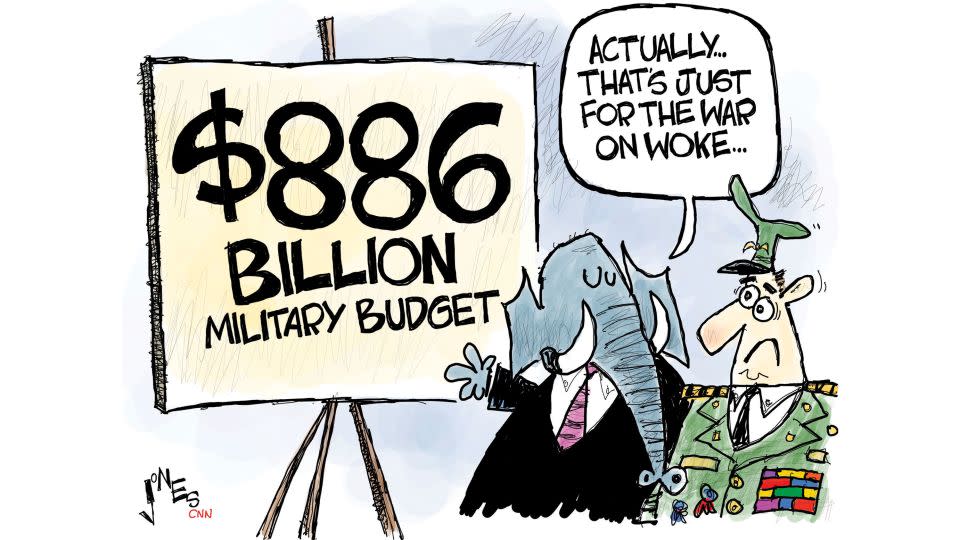
Tuberville’s opposition to the Pentagon’s policy on reproductive health is shared by many in the House GOP majority. On Thursday, the House passed amendments to a defense-funding bill that would end Pentagon allowances for those seeking an abortion, limit medical care for transgender people and eliminate the military’s diversity, equity and inclusion — all measures that many Democrats say they won’t accept.
In a piece published by Fox News, Tuberville wrote, “Over the last two years the Left has been relentless in turning the military from the world’s greatest killing machine to just another outfit for liberal social engineering.”
The controversy puts House Speaker Kevin McCarthy in another tough spot, wrote Patrick T. Brown. On the one hand, he had to deliver votes to continue funding the military while also appeasing the hard-line members who want to force changes in Pentagon policy.
“McCarthy clearly wanted to get the massive defense bill passed in a timely fashion. But the reality eventually set in – even if it makes final passage more difficult, conservative members, and the activists they hear from, were not going to swallow being told to take a back seat when it came to the abortion-related travel issue.” Still, he will face an uncomfortable moment when the Democratic-controlled Senate and White House balk at the social policy amendments in the defense bill.
“McCarthy’s speakership, so far, has been the equivalent of a beat-up jalopy, hanging together long enough to get Republicans from point A to point B, and even showing a surprising amount of agility around some twist and turns. But he hasn’t gotten to his destination.”
For more on politics:
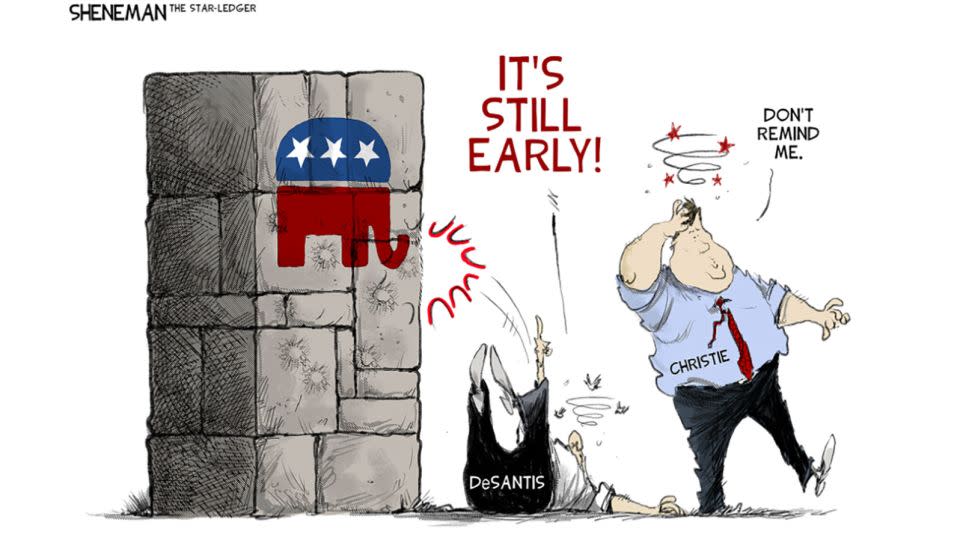
Dean Obeidallah: This is the real reason Ron DeSantis is struggling in the polls
Cluster bombs

As a former spokesperson for UNICEF, Michael Bociurkiw wrote that “I have spent years … defending the organization’s stance against cluster munitions for the simple reason of the great threat they pose to children long after warring parties have abandoned the battlefield. And if you’ve ever seen a child badly mangled from picking up unexploded ordnance, it’s an image that is difficult to forget.”
The United States has for the first time supplied cluster munitions to Ukraine, which is struggling to source enough ammunition for its ongoing counteroffensive against Russia’s invasion. “The weapons in question are banned by more than 120 countries — including 23 NATO member states but not the US or Ukraine — under the 2008 Convention on Cluster Munitions. In June, a coalition of 38 organizations that included Human Rights Watch and the United States Fund for UNICEF urged the White House to ‘remain steadfast’ against any cluster munitions transfers,” Bociurkiw noted.
He quoted from the coalition’s letter: “Cluster munitions are among the most harmful weapons to civilians, as they are designed to disperse indiscriminately across a wide area and often fail to explode on initial use, littering communities with unstable unexploded ordnance and causing devastating harm to civilians, and especially children, years after a conflict ends.”
The choice is more complicated, argued former Rep. Adam Kinzinger, a lieutenant colonel and pilot in the Air National Guard. “In a perfect world, we would ban all munitions,” he wrote. “Differences between nations could be settled in a court or on a soccer field. But that world doesn’t exist. A nation so pointlessly attacked as Ukraine should be able to do everything to defend itself. Americans would likely consider doing the same if we were attacked.”
“And every nation that signed on to that prohibition of cluster munitions would likely use them in a heartbeat if they were faced with a similar invasion. It’s unfair and unreasonable to request Ukraine not respond with whatever it needs to end this threat.”
NATO expands
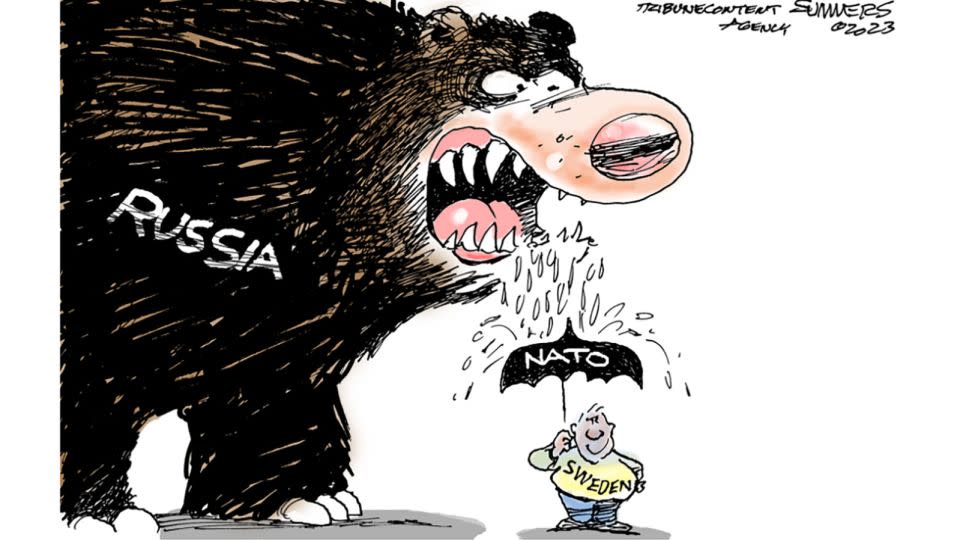
It was a “painful blow” to Russian President Vladimir Putin, wrote Frida Ghitis. Turkey dropped its objection to admitting Sweden to the NATO alliance, clearing the way for it to become the second Scandinavian nation to join as a reaction to the Ukraine invasion.
“Putin had two objectives with his war. One was taking control of Ukraine, which he claimed has no right to exist; the other was weakening NATO. Russia’s unprovoked invasion of its neighbor strengthened Ukrainians’ sense of nationhood and led to the expansion of NATO on Russia’s border.”
“Finland, which already lost territory to the Kremlin after it launched an invasion decades ago, has the longest European Union border with Russia at 832 miles. And this past spring, the country started building a fence at the border amid security concerns. It officially became NATO’s 31st member in April.”
Putin’s Russia is now a “weird, through-the-looking-glass world … where everything is its opposite and almost nothing is what it seems,” wrote scholar Daniel Treisman.
Look at what has happened in recent weeks: “A band of mercenaries seizes a major city, shoots down multiple aircraft and drives a column of tanks to within 125 miles of Moscow, with the declared aim of ousting the defense minister. The president quickly pardons them and says their billionaire commander can withdraw, untouched, to Belarus.”
“An opposition politician leads peaceful protests and campaigns for honest elections. Branded a traitor and prosecuted for ‘extremism,’ he now spends his days in a concrete punishment cell, denied even a pen and paper,” Treisman wrote, of Alexey Navalny.
Vermont deluge
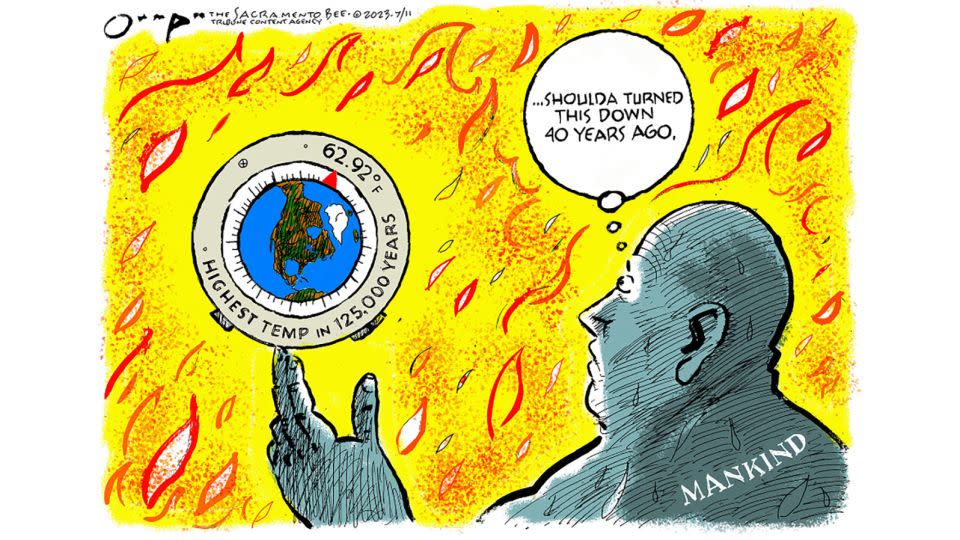
“Vermont is under water.”
That was the message from author and critic Jay Parini, who teaches at Middlebury College. “The rains that swept the state in the past week have been nothing less than biblical. Massive flooding has turned our sweet capital city, Montpelier, into a lake where cars are buried, with water reaching to the second story in many buildings.”
“I moved to Vermont 50 years ago, thinking it was high and dry, a place apart from the usual chaos of the world, protected from the kinds of weather events one reads about in places like New Orleans or Texas or Florida. Vermont has seemed largely peaceful, a kind of rural idyll, with endless cows grazing in the fields, with rolling mountains that are, in summer, as verdant as their name, the Green Mountains.”
But no part of the earth is immune to the heightened risk of extreme weather associated with a warmer atmosphere.
“Several days ago,” Parini wrote, “I went onto Lake Champlain on a Saturday afternoon with my wife. It would usually be crowded with sailboats, kayaks, canoes, and motorboats, a summer playground. Eerily, we were the only boat in sight, and it was soon obvious why this was so.”
“The air was thick with smoke from the Canadian wildfires, which made the entire northeast a danger zone. I wondered if we should just turn around and go back to the dock, but we persisted, floating in the middle of the lake as the rancid smoke, a kind of hellish smog that tore at the lungs, settled on the water. The fact that we are not separate from the effects of climate change hit me hard.”
Singles
People are living alone in the US in record numbers. As Jill Filipovic noted, “In 1940, just about 8% of American households were made up of ‘solitaires.’” Today the number is nearly 30%.
“Part of this shift reflects an expanding universe of opportunities for young people and for women in particular. With more women going to college and participating in the workforce, the old model of female dependence on a male earner has largely fallen by the wayside. As a result, most women don’t have to marry in order to find financial security or social approval.”
“For many Americans – especially those with college degrees – this period of less-fettered young adulthood brings myriad benefits. People who spend their 20s and even 30s single often enjoy all kinds of opportunities that were far less available to previous generations: opportunities to make deep friendships the center of one’s social and emotional life, to travel and adventure, to explore our own needs and desires, to live alone, to pursue our passions and careers without the weight of multiple dependents, to date around and figure out what it is we actually want, like and need in a partner.”
“The economic self-sufficiency that so many women now enjoy means that far fewer women have to settle for abusive or unkind partners – or even those who are perfectly decent, but just not the right fit for them…”
But there is a caution, Filipovic added: “An increase in singles has coincided with an increase in disconnection, isolation and loneliness, all of which are associated with poorer mental, physical and financial health.”
College athletes
Harvard University, which was on the losing end of the Supreme Court’s ruling that struck down the use of affirmative action in college admissions last month, faces a new challenge to its policy of favoring “legacy” candidates — the children of donors and alumni — from a group that filed a complaint with the US Department of Education.
A sharp eye should also be cast on the admission of athletes to highly selective colleges like Harvard, wrote John MacIntosh, who played squash and tennis at Princeton University. “At Harvard, the admission advantage enjoyed by recruited athletes dwarfs that of legacies or any other group,” he noted.
“An analysis by Nobel Prize-winning economist David Card (which was submitted as part of what became the Supreme Court ruling) demonstrated that athletes with lower academic qualifications got a bump of 1,000 times —from 0.07% to 70% — in their chance of admission to Harvard. It also showed that Asian American applicants were most disadvantaged vis-à-vis White applicants when the criterion by which they were assessed was athletics. All this raises issues of fairness and equity.”
“Athletic recruitment is also an explicit, group-based quota system that goes against the spirit of the Supreme Court’s decision, which argues that each applicant should be judged on individual merits and not as a member of a group that the institution wants represented on campus.”
Many Barbies

Hollywood’s actors went on strike last week, joining screenwriters on the picket lines. Coincidentally, this week will feature the release of two major summer films, “Oppenheimer” and “Barbie,” even though the film industry may be in for a long shutdown. (“Barbie” is being distributed by Warner Bros., which shares a parent company with CNN.)
“I haven’t seen (Greta) Gerwig’s movie yet, but I do know that, along with almost every woman I know,” wrote Sara Stewart, “I have had a lot of feelings about the resurgence of Barbie in public consciousness over the past six months.”
“And all those feelings are … complicated. In the pantheon of iconic children’s toys, this buxom doll looms especially large as a Rorschach test of gendered playtime. Is Barbie a trailblazing feminist? A representative of the worst sort of body-image policing? Is she a liberator of girlhood dreams, or an outdated tool of the patriarchy? The answer seems to be: All of the above.”
The rise of Bidenomics

As the Affordable Care Act became more popular with Americans, the Obama administration decided to embrace the “Obamacare” label. Something similar may be impelling President Biden to speak up in favor of “Bidenomics,” wrote Lanhee J. Chen. Except for this difference — so far voters are not signaling that they approve of Biden’s handling of the economy.
That may start to shift with the recent good news on inflation, which dropped to an annual rate of 3% last month, compared to 9.1% last June.
“Whether it’s the Inflation Reduction Act, which will pour hundreds of billions of dollars of government spending into the US economy, the CHIPS Act, which invests public dollars to promote US leadership in the semiconductor space, or the bipartisan infrastructure law, which will spawn new construction projects throughout America, the trick for Biden is to emphasize his accomplishments while not appearing to declare prematurely that the battles against inflation and recession have been won.”
Biden hopes his new push arms “Democrats with information about why he deserves reelection and perhaps, more importantly, galvanizes them to turn out.”
“Second, Biden needs an argument to convince wary independents that he deserves four more years in office. For these voters, Biden’s argument that he is ‘not Trump’ may simply not be compelling enough the second time around.”
But part of Biden’s muscular intervention in the economy is giving him a potential headache. His plan to jumpstart the production of electric vehicles will create jobs, but the United Auto Workers, which is negotiating with the Big Three automakers, wants assurances they will be union jobs, wrote Julian Zelizer.
The UAW “has withheld an endorsement for Biden in the upcoming 2024 election until the president offers clarity on what kind of support he will provide for workers dealing with the potentially detrimental labor impact of the shift to building electric vehicles.”
While declaring he wants to be the strongest pro-union president ever, Biden also has cited the fight against climate change as a top priority — and electric vehicles are central to significantly cutting carbon emissions.
Don’t miss
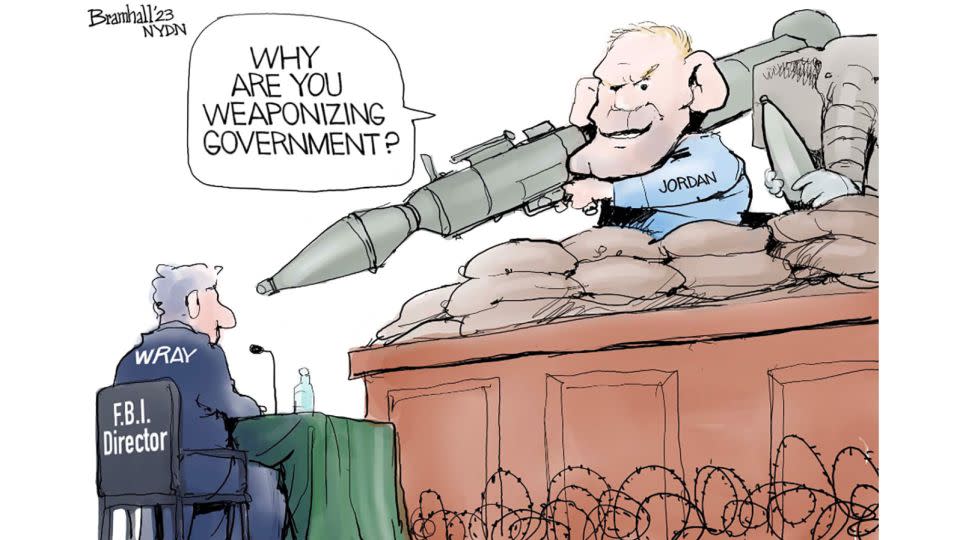
Roy Gutterman: Contacting tech companies about disinformation isn’t government censorship
Holly Thomas: Jonah Hill’s misappropriation of popular therapy-speak
Ruth Marks Eglash: After living for so long in Israel, this is the story I had to write
Regina Kim: The foul-mouthed, free-spirited fun of ‘Joy Ride’
Roy Schwartz: The new Superman is half Jewish. Here’s why that’s making waves
AND…
What a commute

Sophia Celentano went viral on TikTok when she revealed that she commutes by plane from South Carolina to New Jersey for her marketing internship at Ogilvy Health. It’s a very long day —up at 3 a.m. “to catch a 6 a.m. flight most Wednesdays, and after finishing my 9-to-5 workday, I then catch a 9 p.m. flight back home, which lands at 11 p.m.”
Luckily, she only needs to be in the office one day a week. And it saves her a lot of money, Celentano observed.
“Rather than spending around $2,000 a month on rent (the average near my office in Parsippany, New Jersey), I book a $100 round-trip flight from Charleston, South Carolina, on the one day a week I work in person. This way, I’m able to live with my parents rent-free. After adding in $100 for Ubers to and from the office and $25 for dinner at the airport (given that I pack breakfast and have catered lunch at the office), I only spend about $900 a month on my commute; much less than I would be spending living near my office full time.”
“Taking a plane to work as an intern might scream privilege to some, but it’s an innovative solution to a real estate market that’s unbearable for many of us.”
For more CNN news and newsletters create an account at CNN.com

